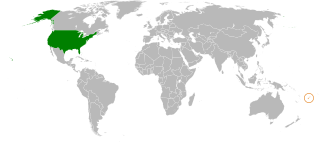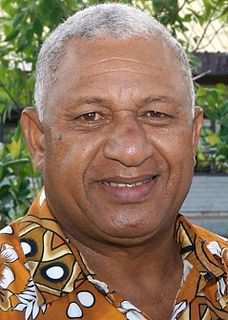
Ratu Sir Kamisese Mara, CF, GCMG, KBE is considered the founding father of the modern nation of Fiji. He was Chief Minister from 1967 to 1970, when Fiji gained its independence from the United Kingdom, and, apart from one brief interruption in 1987, the first Prime Minister from 1970 to 1992. He subsequently served as president from 1993 to 2000.

The President of the Republic of Fiji is the Head of State of Fiji. The President is appointed by the Parliament of Fiji for a three-year term under the terms of the 2013 Constitution of Fiji. Although not entirely a figurehead, the President's role in government is mostly ceremonial, but there are important reserve powers that may be exercised in the event of a crisis. In addition, the President is Commander-in-Chief of the Military Forces.

Sitiveni Ligamamada Rabuka, OBE, MSD, OStJ, is best known as the instigator of two military coups that shook Fiji in 1987. He was later democratically elected as Prime Minister of Fiji, serving from 1992 to 1999. He went on to serve as Chairman of the Great Council of Chiefs, and later served as Chairman of the Cakaudrove Provincial Council from 2001 to 2008. He was elected to this position on 24 May 2001 and re-elected for another three-year term on 13 April 2005. On 24 June 2016, Rabuka was elected as leader of the Social Democratic Liberal Party, succeeding Leader of the Opposition Ro Teimumu Kepa, who publicly disapproved of Rabuka's nomination to replace her. On 26 November 2018, Rabuka was appointed as the leader of the Opposition to Parliament, following the 2018 election defeat. Rabuka was the only nomination for the position and his nomination was moved by Ro Teimumu Kepa and seconded by Biman Prasad.

Josaia Voreqe Bainimarama CF, MSD, OStJ, known commonly as Frank Bainimarama and sometimes by the chiefly title Ratu, is a Fijian naval officer and politician who has been Prime Minister of Fiji since 2007. He was the Commander of the Fijian Military Forces from 1999 to 2014. While holding the office of Prime Minister, he has temporarily held various ministerial portfolios: Information, Home Affairs, Immigration, Public Service, Indigenous and Multi-Ethnic Affairs, Finance, and Foreign Affairs.

The Fiji coup of 2000 was a complicated affair involving a civilian coup d'état by hardline i-Taukei nationalists against the elected government of a Fijian of Indian Descent Prime Minister, Mahendra Chaudhry, on 19 May 2000, the attempt by President Ratu Sir Kamisese Mara to assert executive authority on 27 May, and his own resignation, possibly forced, on 29 May. An interim government headed by Commodore Frank Bainimarama was set up, and handed power over to an interim administration headed by Ratu Josefa Iloilo, as President, on 13 July.

The Constitution of Fiji, which had been abrogated by the interim military government of Commodore Frank Bainimarama, was reinstated by the High Court on 15 November that year. This ruling was upheld by the Court of Appeal on 1 March 2001. Since then, a police investigation has begun, and a number of high-profile trials have taken place, resulting in the conviction and imprisonment of some members of the present government, which came to power in the wake of the coup.

Following the quashing of George Speight's civilian coup d'état in 2000, the Military handed power over to a civilian administration led by the banker, Laisenia Qarase, who won the parliamentary election held to restore democracy in September 2001. Despite the role of the military in the rise to power of the Qarase government, relations between them noticeably deteriorated subsequently, to the extent that by July 2004, the Military was threatening to overthrow the government.

A number of separate, but overlapping, investigations were conducted by the police into various aspects of the 2000 coup. These investigations include the organization and financing of the coup, and the identity of the perpetrators. Some alleged that George Speight was only a front-man for a shadowy group of politicians and businessmen; former prime minister Sitiveni Rabuka was reported to be one of those under investigation. Police Commissioner Andrew Hughes revealed on 4 January 2006 that seven major investigations were currently in progress. In addition, a number of other investigations have either taken place or are being considered.
Andrew Charles Hughes was an Australian police officer of the Australian Federal Police (AFP) who served as the Chief Police Officer (CPO) for the Australian Capital Territory (ACT) and the Head of the United Nations Police Division. The CPO position is similar to the role of Australian Commissioners of Police, that is, the chief executive of the ACT Policing component of the AFP. ACT Policing forms one of the larger operating components of Australia's national policing agency, the Australian Federal Police. He was also Commissioner of Police in Fiji from 2003 to 2006. Hughes died of bowel cancer in 2018, aged 62.
Moses Driver is a Fijian police officer, who is the immediate past Deputy Commissioner of Police. In this capacity, he assisted Commissioner of Police Andrew Hughes.

The tension between Fiji's government and Military forces, which had been simmering for more than two years, appeared to escalate in late December 2005. Tension between the government and the Military had been simmering throughout the year, with Commodore Bainimarama and other Military officers making strongly worded public statements opposing certain government policies, including the early release from prison of persons implicated in the Fiji coup of 2000, and the government's promotion of controversial legislation to establish a Commission with the power to grant amnesty to perpetrators of the coup.

The crisis that saw a virtual breakdown in relations between Fiji's government and military forces in late 2005 and early 2006, generated fears of civil unrest and even a military coup. The dismissing of Lieutenant Colonel Jone Baledrokadroka, the Acting Land Force Commander, for alleged insubordination on 12 January 2006 was coupled with unusual deployments of troops and naval vessels. Both before and after it was resolved on 16 January with a truce brokered by Acting President Ratu Joni Madraiwiwi, the crisis generated a great deal of comment.
Captain Esala Teleni is a Fijian naval officer, who served the military-backed interim government as Commissioner of the Fiji Police Force from 1 July 2007 to mid-2010. He then served as Fiji's Ambassador to China till 2014. He is currently the Fijian High Commissioner to Papua New Guinea.

Police spokeswoman Sylvia Low announced on 25 August that they were considering opening an investigation into allegations made the previous day by the Military Commander, Commodore Frank Bainimarama, that Senator Apisai Tora and a number of others had approached him in the Fijian Holdings boardroom during the 2000 crisis and asked him to remove from office President Ratu Josefa Iloilo. "If he claims to be fighting for indigenous Fijian rights, then he should explain to the general public why he tried to remove the Tui Vuda who is a chief of his province," Bainimarama said. An interview was arranged between Bainimarama and Assistant Commissioner of Police Crime ACP Kevueli Bulamainaivalu. According to Bainimarama, the 2000 was instigated by "corrupt politicians", and the way to guarantee stability in Fiji was to remove them "from the equation."

Fiji – United States relations have improved significantly since Fiji's elections in September 2014, which restored a democratically elected government to Fiji for the first time since 2006. The United States had opposed Fiji's unelected government, which came to power through a military coup in December 2006.
Maciu Navakasuasua is a Fijian public figure and former political organizer. An explosives expert, Navakasuasua said that on behalf of the Nationalist Vanua Tako Lavo Party, an extremist party which advocated the "repatriation" to India of Indo-Fijians, two prominent businessmen had tried to hire him to assassinate Prime Minister Mahendra Chaudhry in 1999 while he was passing through Nadi International Airport. Navakasuasua served a three-year prison sentence on Nukulau Island for coup-related offences.
The Fijian constitutional crisis of 2009 began on Friday, 10 April 2009. Fijian President Ratu Josefa Iloilo announced on a nationwide radio broadcast that he was abrogating the Constitution of Fiji. He dismissed all judges and constitutional appointees and assumed all governance in the country after the Court of Appeal ruled that the government of Prime Minister Frank Bainimarama was illegal. Iloilo reinstalled Bainimarama as PM and his Cabinet members to their positions. He also instituted emergency rule which increased police powers and allowed media censorship.
The National Security Council is, as its name indicates, the Republic of Fiji's National Security Council.








